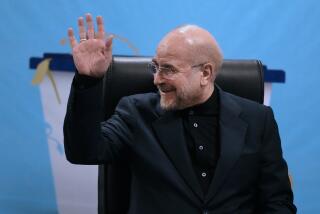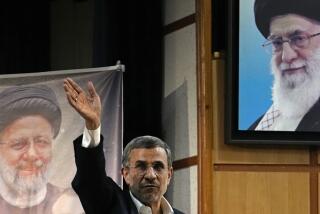Iran launches investigation of prominent opposition cleric
- Share via
CAIRO AND TEHRAN — Iranian authorities launched a provocative attack on the opposition movement Tuesday by announcing a special investigation of prominent cleric Mehdi Karroubi over his accusations that security forces raped and tortured protesters after the disputed June reelection of President Mahmoud Ahmadinejad.
The move against Karroubi, a revered figure from Iran’s 1979 Islamic Revolution, is an attack on the heart of the opposition. It’s an indication that the government is increasing pressure on top dissenters, even clerics, and it follows death sentences handed to at least two anti-government protesters.
The investigation will test the resolve of the opposition and has the potential to unleash another round of street demonstrations, which recently have been largely thwarted by the Revolutionary Guard and the Basiji militia. At a rally in September, protesters shouted: “If Karroubi is arrested, there will be insurrections across Iran.”
The official Islamic Republic News Agency reported that “a legal case prepared by the judicial investigative committee has been sent to the Tehran prosecutor over Karroubi’s claims.”
Chief Prosecutor Abbas Jafari-Dolatabadi was quoted by the agency as saying, “Karroubi is a cleric, and his remarks should be studied at the special court for the clergy. Some people have also been summoned in connection with the case.”
The 72-year-old cleric, whose offices were recently raided by authorities who seized documents and computer files, has charged that security forces and prison guards raped detained protesters.
The government has denied the claims, and Ahmadinejad and hard-line Republican Guard commanders have repeatedly called for his arrest.
A judiciary panel found that Karroubi’s “allegations are unsubstantiated, and documents submitted are totally fabricated and aimed at misleading public opinion.”
Karroubi, a former speaker of parliament, finished fourth in the June presidential election. He has aligned himself with opposition leader Mir-Hossein Mousavi and former President Mohammad Khatami in calling for an end to police intimidation of demonstrators and in accusing Ahmadinejad of winning a fraudulent election.
At least 30 people have been killed in postelection unrest, and more than 100 protesters are on trial before the nation’s Revolutionary Court.
If Karroubi is accused by a clerical court of “spreading false news and slander against the regime, the rift between the people and the regime will widen and many other officials may be tried,” said Nemat Ahmadi, a human rights lawyer. “Karroubi is not simply a person. He was twice speaker of parliament, and he was close to the late Ayatollah Khomeini in the pre- and post-revolution Iran. I hope this is not more than just a threat against him and doesn’t lead to a trial in clerical court.”
Mohammad Seifzadeh, a human rights lawyer who recently was forbidden to leave the country, said, “I do not know what will happen to Mr. Karroubi, but I know if he cannot prove his assertions [of torture] by concrete evidence, he will not be given an exception, no matter how well-established a politician, cleric and revolutionary he is.”
In an interview with The Times in September, Karroubi, whose newspaper was shut down weeks ago, said, “I won’t go underground. I act publicly and openly. Even if I am arrested and jailed and released, I will go back to open activities.”
The Karroubi investigation comes days after his ally Khatami posted on his website a condemnation of the government’s repression of protest and a larger criticism that Ahmadinejad and supreme leader Ayatollah Ali Khamenei were betraying the ideals of the Islamic Revolution.
“Be sure that people will never back down,” said Khatami, who was president from 1997 to 2005 and has become a leading reformist voice. “Today, we are living in a world in which no dictator could be imposed on people to force them to be absolutely obedient to him. An acceptable government is a government born out of the people.
“Why are we presenting Islam in a way to encourage segments of the society to turn their back on religion and the regime?”
--
Mostaghim is a special correspondent.
More to Read
Sign up for Essential California
The most important California stories and recommendations in your inbox every morning.
You may occasionally receive promotional content from the Los Angeles Times.







